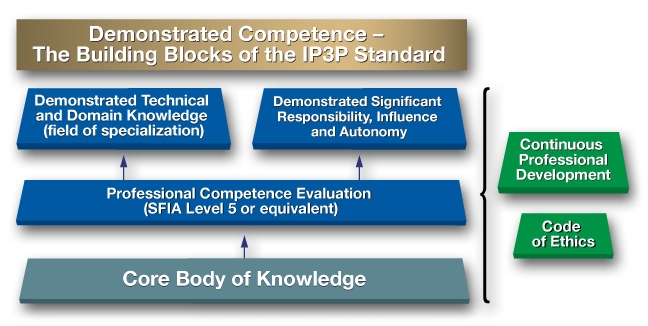Professional IT Standards
As the global partnership for the IT profession, IP3 is committed to developing high-quality international professional standards, promoting strong ethical values, encouraging quality practice, and supporting the development of all sectors of the profession around the world.
The first of the IP3 Professional standards is the IP3P which was developed in 2008. The second is the IP3T which was approved in 2011.
IP3P Standard
Key Features of the IP3P standard
- The IP3P is the IP3 accreditation standard that is used to assess an organization’s professional standard. It applies to the professional certification program and not to individuals.
- The standard is vendor-neutral and independent.
- Only IP3 can award the IP3P to eligible organizations.
- The Skills Framework for the Information Age (SFIA) (or equivalent) is the reference document for establishing the minimum professional standard of competence.
- The professional autonomy and responsibility level has been set at SFIA Level 5 (or equivalent or above).
- Built around a complete requirement for full professional formation.
- Dependant on the maintenance of competence through continuing professional development.
- Supported by a disciplinary code with a process for public complaint and sanctions.
- Accredited organizations who are in good standing are given a limited license to use the IP3P mark in connection with their accredited professional certification standard.
- Individuals who have been certified by an accredited organization may use the mark on business correspondence along with the IP3 accredited certification they have been awarded by their society.
Why Skills Framework for the Information Age?
The Skills Framework for the Information Age (SFIA) is a common reference model for “the identification of the skills needed to develop effective Information Systems (IS) making use of Information Communications Technologies (ICT).” It is used in over 150 countries across the globe and uses a common language and a logical structure outlining required skills, knowledge, and competence. Organizations seeking IP3 accreditation can define their professional standard requirements in terms of SFIA or an equivalent framework.
Mutual Recognition of IP3 Accredited Certification Schemes
The IP3P is the IP3 standard that defines the elements of what constitutes an IT Professional. The standard specifies the requirements that a professional IT certification program needs to contain and defines the minimum professional standards for professional certification.
IP3 accreditation provides a means to increase the international acceptance of professional IT certifications. It establishes a framework for comparison of different professional certification programs that leads to a common understanding between different countries and will facilitate portability of professional membership. A good example of this is the professional membership recognition that exists between the Australian Computer Society (ACS) and the Canadian Information Processing Society CIPS), both IP3P accredited and accepting of each others professional certifications. Mutual recognition does come with a number of safeguards. It provides the right to the association to refuse to admit an individual into its professional membership in keeping with its entry rules. It also provides the right to impose local ‘top-up’ requirements if required for example a local language test.
Material Principles of Mutual Acceptance
IP3T Standard (also known as Certified Technologist)
Established in 2011, the IP3T standard has all of the same requirements as IP3P standard with the exception that the professional autonomy and responsibility level has been set at SFIA Level 3. This standard sets the bar for early IT practitioners.
What is required for an individual to attain IP3T or Certified Technologist (CT) designation?
A Certified Technologist:
- Operates effectively at SFIA level 3 generic capability
- Demonstrates in-depth competence in at least one specialisation at SFIA level 3
- Demonstrates a breadth of ICT knowledge
- Understands and is committed to the IP3 Code of Professional Conduct
Certified Technologist (CT) is the standard for IT Professionals within the first few years of their career. Certified Technologists have proven foundational technology, interpersonal and professional practice skills.
Certified Technologist is not a technical or vendor certification, but a qualification that demonstrates professional practice. Certified Technologists:
- adhere to a Code of Professional Conduct
- continue to develop themselves professionally
- demonstrate they can achieve results
The primary requirement of Certified Technologist is to have been practicing at Level 3 of the Skills Framework for the Information Age (SFIA) for at least a year. This means working under general direction rather than close supervision, performing broad and sometimes complex and non-routine work, and being accountable for their work.
Certified Technologist covers:
- Broad ICT knowledge
- Specialist ICT knowledge
- Professional Knowledge
- Competency and Responsibility
- Sound character

